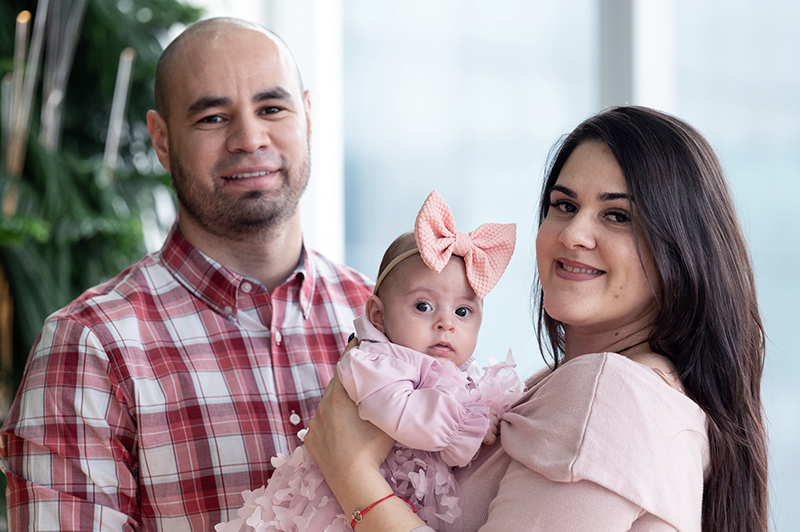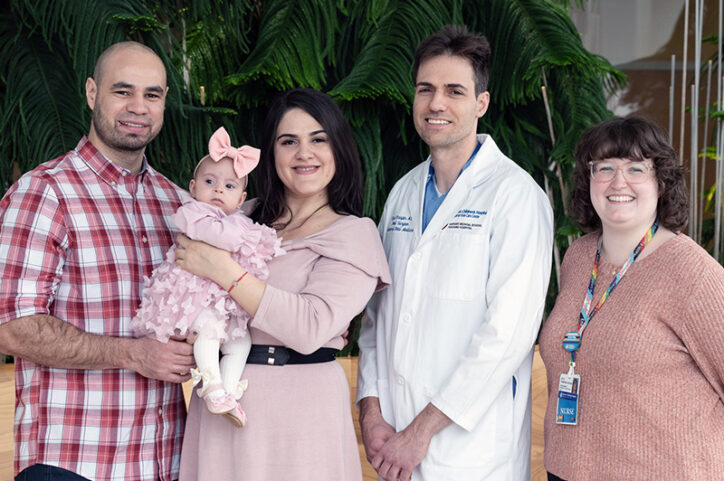For Ana Sofia: How one mom found prenatal care for fetal pleural effusion

Alexandra is the first to admit she asks a lot of questions and needs to know details.
“I’m curious about everything, and I want to know everything,” she says. “I do my research. I’m a pretty resourceful person.”
It’s something she says can be off-putting to some people, but it’s also what saved her daughter’s life.
A wait-and-see approach wasn’t good enough
Alexandra had an uncomplicated, enjoyable pregnancy until a prenatal ultrasound at 30 weeks revealed fetal pleural effusion, an accumulation of fluid in the space around a fetus’s lungs. If left untreated, fetal pleural effusion can affect fetal lung development and, in severe cases, put pressure on vital blood vessels and the heart, potentially leading to heart failure and fetal or neonatal demise. “If the situation worsened, the team’s plan was to deliver early and hope the baby’s lungs had developed enough to survive,” Alexandra says. “But I thought, ‘There has to be something we can do.’ I went into research mode and I found Boston Children’s.” Specifically, she found the Fetal Care and Surgery Center (FCSC).
Reassurance from the team’s experience and pace
Within days of reaching out, Alexandra and her husband, Freddy, met with fetal surgeon Dr. Eyal Krispin and FCSC team members nurse Julia Thompson and social worker Kassie Merrill-Olver.
During her very first visit, Alexandra had multiple imaging tests and other evaluations, including an MRI that revealed that due to the fluid buildup around the lungs, the fetus’s heart was being pushed to the left, compromising blood flow. The team opted for immediate surgery to decrease the amount of fluid.
“Since most of the doctors and people I had talked to before my appointment at Boston Children’s didn’t know what was causing the fluid or how to treat it, one of the first questions I had for Dr. Krispin was, ‘Have you seen this before?’” Alexandra remembers. “He said, ‘This is what we treat. This is what we do.’”
At this point, Alexandra was 32 weeks pregnant, and time was of the essence. The team moved quickly. The following day, Dr. Krispin and Dr. Alireza Shamshirsaz (Shami) performed thoracoamniotic shunting, an in-utero procedure where a small tube is placed into the fetus’s chest to help drain extra fluid around the lungs into the amniotic sac. The result is relieved pressure on the lungs, optimized lung development, improved chances of survival after delivery, and fewer risks of lung-related complications.
Following the procedure, Alexandra spent one night recuperating at Brigham and Women’s Hospital, where she had transferred her prenatal care. She then returned home under close watch by the FCSC and her new obstetrics team, including Dr. Carolina Bibbo. Close watch included regular ultrasounds to monitor the shunt placement. While relieved to have the pressure from the chylothorax relieved, Alexandra continued asking questions about the status of her pregnancy and how things were progressing. She says she truly appreciates how knowledgeable, kind, understanding, and patient her care team was with her need to know every detail.
“I was finally able to breathe and relax knowing the life of my baby was in great hands and they were monitoring her two to three times a week,” Alexandra says. “I cannot explain in words the weight they took off my shoulders. I was finally able to sleep well and know my baby would be ok.”
Grateful for a strong start
About six weeks later, at 38 weeks, baby Ana Sofia made her entrance into the world. Despite a slightly early arrival, Alexandra is confident her daughter’s extra time in utero with the shunt was critical.

“After her delivery, the NICU team confirmed to us that those extra few weeks with the shunt made a big difference,” she says. “The fact that I had the surgery gave her way better chances of developing good lungs and a good heart.”
Ana Sofia spent two weeks in Brigham and Women’s Hospital’s NICU, where she grew stronger and had frequent visits from Dr. Krispin and other members of her care team. She has returned to Boston Children’s for follow-up visits to assess her feeding abilities and her eye health — standard care for babies born prematurely.
Today, Ana Sofia is a healthy, happy, curious 6-month-old who loves to be snuggled and is working on improving her naps. She is being closely monitored by her pediatrician.
“She’s a fighter,” Alexandra says. “She had a very strong will to fight. We are so lucky. I know for sure that we were lucky because of the dedication and care of the FCSC team and because I never accepted no for an answer. I will be eternally grateful to them for making sure my baby survived and can live a healthy and happy life.”
Learn more about the Fetal Care and Surgery Center.
Related Posts :
-

Finding comfort and answers for twin-twin transfusion syndrome: Shannon’s story
Shannon’s journey through a challenging pregnancy with TTTS (twin-twin transfusion syndrome) was, as she puts it, an emotional rollercoaster. ...
-

A partner through amniotic band syndrome: Jace’s story
Jace is a happy, energetic 9-month-old whose big brown eyes light up a room. He’s adored by his parents, ...
-

Rowan the Remarkable: Defying the odds with CPAM
This is the story of a baby named Rowan and his remarkable journey of beating the odds after doctors discovered ...
-

Changing the world: Baby Denver leads the way after first-of-its-kind procedure for VOGM
Denver Coleman is less than 2 months old, but she’s already helped blaze a trail for other children and families, ...





